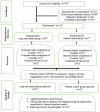Enhancing Quality of Life in Patients With Hypothyroidism Using a Scientific Yoga Module: Randomized Controlled Trial
- PMID: 40570327
- PMCID: PMC12246764
- DOI: 10.2196/54078
Enhancing Quality of Life in Patients With Hypothyroidism Using a Scientific Yoga Module: Randomized Controlled Trial
Abstract
Background: The impact of hypothyroidism on quality of life is extensively documented, highlighting its substantial physical, psychological, and social burden. Yoga has demonstrated promising therapeutic benefits in improving hypothyroidism outcomes. Leveraging telehealth's growth, this study used a rigorously designed scientific yoga module specifically tailored for digital delivery for patients with hypothyroidism undergoing levothyroxine treatment.
Objective: This study aimed to assess the impact of a 6-month tele-yoga intervention in patients with hypothyroidism by comparing outcomes between those receiving levothyroxine combined with tele-yoga and those receiving only levothyroxine treatment.
Methods: A single-blinded, 2-arm, parallel-group randomized controlled trial was conducted for 6 months (April 1, 2022-September 30, 2022) with 134 clinically diagnosed patients with hypothyroidism recruited from the Arogyadhama Holistic Health Home registry (2013-2021). Participants were randomized to either a yoga intervention group or a waitlist control group with 67 in each group and assessed at 3 time points (before, in the middle of, and after the intervention) for primary and secondary outcomes. The 36-Item Short Form Health Survey for health-related quality of life was used as a primary measure, whereas secondary measures included thyroid profile, BMI, blood pressure, the Fatigue Assessment Scale, the Perceived Stress Scale, and the Gita Inventory of Personality. Clinical data were collected via online questionnaires, and laboratory data (thyroid profile blood pressure and anthropometric measurements) were obtained in person using standardized instruments. A generalized linear model with repeated-measure ANOVA was used to evaluate both within- and between-group effects. In addition, in the yoga intervention group, performance was assessed using a yoga performance assessment scale, and satisfaction was measured through a structured feedback survey.
Results: The intervention showed highly significant effects across all domains of the primary outcome measure (P<.001), with the most notable effects on mental health (F2, 118=425.88; η2=0.88), energy and vitality (F2, 118=371.73; η2=0.86), and role limitations-emotional (F2, 118=335.45; η2=0.85). Secondary measures also showed significant improvements (P<.001), except for thyroxine (P<.014). Average yoga performance assessment scores increased significantly from 65.08 (SD 10.97) to 88.62 (SD 11.18; P<.001), indicating that most participants could easily perform the practices. Overall, 95% (64/67) of the participants in the yoga intervention group expressed high satisfaction with the tele-yoga intervention.
Conclusions: This clinical trial is the first to demonstrate the benefits of a digitally delivered scientific yoga module combined with levothyroxine treatment for hypothyroidism. It highlights the efficacy of instructor-led tele-yoga as a scalable eHealth intervention, enhancing accessibility, long-term engagement, and sustainable health outcomes. Patients receiving tele-yoga alongside levothyroxine showed significantly greater improvements than those on levothyroxine alone, highlighting the value of integrating eHealth into thyroid care for a more comprehensive, patient-centered approach.
Trial registration: Clinical Trials Registry-India CTRI/2022/03/041047; https://ctri.nic.in/Clinicaltrials/pmaindet2.php?EncHid=NjY5NzI.
Keywords: digital health; health-related-quality of life; hypothyroidism; randomized controlled trial; scientific yoga module; tele-yoga.
©Savithri Nilkantham, Amit Singh, Vijaya Majumdar, Harini K N, Snigdha Atmakur. Originally published in the Journal of Medical Internet Research (https://www.jmir.org), 26.06.2025.
Conflict of interest statement
Conflicts of Interest: None declared.
Figures
Similar articles
-
Yoga for chronic non-specific low back pain.Cochrane Database Syst Rev. 2022 Nov 18;11(11):CD010671. doi: 10.1002/14651858.CD010671.pub3. Cochrane Database Syst Rev. 2022. PMID: 36398843 Free PMC article.
-
Exercise interventions on health-related quality of life for people with cancer during active treatment.Cochrane Database Syst Rev. 2012 Aug 15;2012(8):CD008465. doi: 10.1002/14651858.CD008465.pub2. Cochrane Database Syst Rev. 2012. PMID: 22895974 Free PMC article.
-
Yoga treatment for chronic non-specific low back pain.Cochrane Database Syst Rev. 2017 Jan 12;1(1):CD010671. doi: 10.1002/14651858.CD010671.pub2. Cochrane Database Syst Rev. 2017. Update in: Cochrane Database Syst Rev. 2022 Nov 18;11:CD010671. doi: 10.1002/14651858.CD010671.pub3. PMID: 28076926 Free PMC article. Updated.
-
Yoga for epilepsy.Cochrane Database Syst Rev. 2017 Oct 5;10(10):CD001524. doi: 10.1002/14651858.CD001524.pub3. Cochrane Database Syst Rev. 2017. PMID: 28982217 Free PMC article.
-
Yoga for stroke rehabilitation.Cochrane Database Syst Rev. 2017 Dec 8;12(12):CD011483. doi: 10.1002/14651858.CD011483.pub2. Cochrane Database Syst Rev. 2017. PMID: 29220541 Free PMC article.
References
-
- Deekshitulu BP. Healing of chakras meditation on psychological stress. Indian J Posit Psychol. 2014;5(4):398–402. https://www.proquest.com/openview/9eaca661a90da5757b38f1e61638205c/1?pq-...
-
- Chiovato L, Magri F, Carlé A. Hypothyroidism in context: where we've been and where we're going. Adv Ther. 2019 Sep 04;36(Suppl 2):47–58. doi: 10.1007/s12325-019-01080-8. https://europepmc.org/abstract/MED/31485975 10.1007/s12325-019-01080-8 - DOI - PMC - PubMed
-
- Pamuru RR. Review on thyroid disorders, epidemiology and treatment methods. J Endocrinol Res. 2019;1(2):1–5. doi: 10.30564/jer.v1i2.1241. https://doi.org/10.30564/jer.v1i2.1241 - DOI - DOI
-
- Kim EY, Kim SH, Rhee SJ, Huh I, Ha K, Kim J, Chang JS, Yoon DH, Park T, Ahn YM. Relationship between thyroid-stimulating hormone levels and risk of depression among the general population with normal free T4 levels. Psychoneuroendocrinology. 2015 Aug;58:114–9. doi: 10.1016/j.psyneuen.2015.04.016.S0306-4530(15)00156-0 - DOI - PubMed
-
- Wysokiński A, Kłoszewska I. Level of thyroid-stimulating hormone (TSH) in patients with acute schizophrenia, unipolar depression or bipolar disorder. Neurochem Res. 2014 Jul 11;39(7):1245–53. doi: 10.1007/s11064-014-1305-3. https://europepmc.org/abstract/MED/24723220 - DOI - PMC - PubMed
Publication types
MeSH terms
Substances
LinkOut - more resources
Full Text Sources
Medical
Miscellaneous




